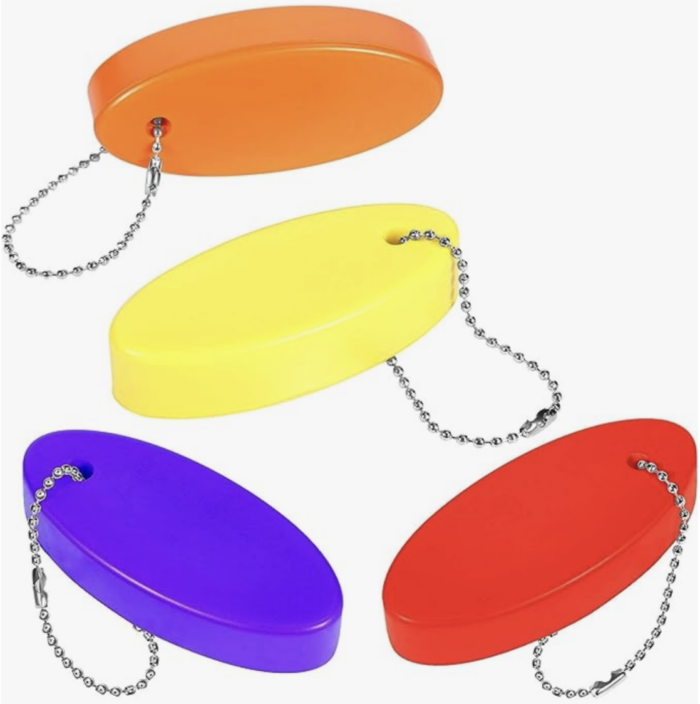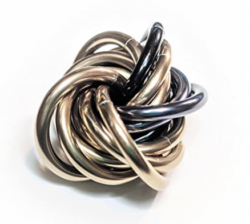Remember when you could wake up every day and, you know, live your life? These days, life feels more like a runaway freight train. The 24/7 news cycle. Nonstop Zoom meetings. Social media that’s ALWAYS ON.
Who among us is merely stimulated these days? Overstimulation—that feeling of being emotionally overloaded and overwhelmed—feels like our way of life now. All you can do is hold on but your grasp loosens a bit more in each passing day. Sad.
But true. According to a 2022 survey, 82 percent of Americans have experienced overstimulation. And over 90 percent of millennials and Gen Zers, have felt it during a social situation. Driving those numbers up: The quiet cocoon of the pandemic—especially work from home—decimated our tolerance for the sensations of daily life. Now we’re physically reacclimating, but our brains are a booster behind.
Overstimulation generally refers to the stress you experience when you’re exposed to too many sensory, cognitive, or emotional inputs at once. To put it plainly: There’s a crap-ton going on and your brain can’t deal.
The symptoms of overstimulation are fairly universal—irritability, exhaustion, and angry outbursts—but the emotional and physical response varies for everyone. Some examples:
- You’re at a concert with a big crowd, loud music, and flashing lights. Suddenly, you feel extremely uncomfortable, emotionally and physically. You cover your ears and look for a hole to crawl into. That’s sensory overstimulation.
- Your to-do list feels out of control. You take on a hundred tasks at once or try to process mountains of information at the same time, making you anxious and irritable. You have trouble concentrating and productivity plummets. That’s cognitive overstimulation.
- You’re having an intense argument with your sig other or you’re experiencing a traumatic event and trying to keep up with the emotions that come with it. Your mental capacity is running on empty and you feel physically drained. That’s emotional overstimulation.
Being overstimulated can activate the body’s sympathetic nervous system, also known as your “fight or flight” response. This leads to the release of stress hormones like adrenaline and cortisol and an increase in heart rate. This response itself can feel overwhelming, so it’s no surprise that overstimulation can lead to further anxiety, fatigue, distress, agitation, and crushing stress. Cue the downward spiral. Next stop: the emotional sewer.
Sign up for our free newsletter
Legit tips and cool copes, delivered straight to your inbox.
By completing this form you are signing up to receive our emails and can unsubscribe anytime.
Although most people have probably felt overstimulated at some point, humans with ADHD, OCD, PTSD, and anxiety are more prone to sensory overload because of the way their brains are wired.
- ADHD: These peeps already struggle to filter out irrelevant stimuli (the “squirrel” stereotype) and can get easily overwhelmed by a flood of information.
- OCD: Overstimulation can ramp up negative intrusive thoughts and compulsive and repetitive behaviors.
- PTSD: Overstimulation in the present can trigger the sensory overload of the past, which can be difficult to switch off.
- Anxiety: You may experience racing thoughts, catastrophizing, and physical tension when overstimulated.
Yes, being overstimulated can feel debilitating—especially when it happens on the reg. But you don’t have to be stuck in the suck. We asked experts how to ease the overload in the moment. By finding ways to calm your nervous system, you’ll be better equipped to handle the negative thoughts and physical feelings that come with overstimulation, stopping the spiral before you hit the drain.
RELATED: Overreact Much? Here’s Why—and What to Do About It
Remember that while these tips do come from the pros, they aren’t one-size-fits-all. Experiment and find what works for you. And if overstimulation is leading to distress and impacting your daily life, it’s always best—like we always say—to speak with a therapist.
1. Lower Your Body Temp
“When people are at a high level of distress, certain skills are very helpful,” explains Ariela Vasserman, Psy.D., psychology director of New York University Langone Psychiatry Associates. “One is working on changing your body temperature, which can bring that physiological distress down.”
If you’re at home, she suggests sticking your head under really cold water to bring your heart rate down quickly. If you’re out in public or at the office, grab an ice cube or cold compress, and put it against your neck, on your wrists, and under the arms to cool you down and reduce your heart rate.
The cold stimulates the vagus nerve—think of it as your body’s Tibetan monk switch. When activated, it slows your heart and respiratory rates, calming you and regulating your mood, according to a study in Frontiers of Psychiatry.
2. Move Your Body—Quickly
Instead of a hot girl walk, try a hot girl sprint. It can help relieve excessive energy and tension and, like ice on the neck, “change the physiological response to the distress.” says Dr. Vasserman.
“It doesn’t have to be like running a marathon,” she says. “It could just be running up and down the stairs for five minutes if you have a moment to step out.”
Other options, which you can do just about anywhere, include a few minutes of jumping jacks, jump squats, burpees, or pushups.
3. Try 4-7-8 Breathing
You knew a breath tip was coming, right? But not just any breathing exercise will do here. Techniques in which the inhale is a lot shorter than the exhale are particularly helpful in tempering the sympathetic nervous system, explains psychologist J. Ryan Fuller, Ph.D., executive director of New York Behavioral Health.
He recommends a relaxation response called 4-7-8 breathing. You inhale for four counts, hold for seven counts, and exhale for eight counts. Do four or five cycles, says Dr. Fuller.
The counts don’t have to be complete seconds—what’s important is the 4-7-8 ratio, making sure your exhale is twice as long as your inhale. Why? Because your heart rate slows as you exhale.
And while this breathing technique comes in clutch when you’re out in public or in a crowded space (big presentation, BF’s parents’ house, Eras tour), practice 4-7-8 breathing before the time comes—when you’re not feeling overwhelmed.
The more you train yourself on how this exercise works and feels, says Dr. Fuller, the better prepared you’ll be to execute it when it really matters.
4. Activate All Your Senses at Once
When 800 things are going on around you, you need to return to basics. Yes, the next two techniques are considered “mindfulness,” but in essence both are about tapping into your five senses and tuning into the present to help calm down.
“The way I visualize mindfulness is that you’re practicing awareness, focusing your attention onto one thing at a time,” Dr. Vasserman explains. “Attending to your thoughts or feelings in a way that’s nonjudgmental could be really helpful in terms of bringing [a high] physiological sensation down.”
This can play out two ways:
- Mindful observation. Tune into the sensations you experience when you’re anxious: heart beating really fast, butterflies in the stomach, racing thoughts, worrying about the future. “Notice and observe, but don’t judge all of those things,” Dr. Vasserman says. “Often, people have a very hard time controlling their feelings or thoughts, but with mindfulness, even if you can’t control those things, you can learn to control your attention.”
- 5-4-3-2-1 technique. Identify five things you see in your surroundings, four things you can hear, three things you can touch, two things you can smell, and one thing you can taste. If you’re on a crowded subway, for example, you can look at the images on the ads above you or the shirt color on the person next to you. You can listen to music or a podcast through your earbuds, or the rattling of the train on the tracks. For touch, you can feel your clothing or jangle your keys in your hands. Smell and taste your beverage or a snack you have in your bag.
As with breathing exercises, Dr. Vasserman encourages people to practice mindfulness techniques even when they’re not in distress. This way, you’ll be better prepared to lean on them when you need to.
5. Keep Your Hands Busy…
Our experts agree that handheld tools—such as fidget spinners, bubble fidget poppers, stress balls, and even Play Dough—can all help you cope with overstimulation. Simply focus your attention on the sensations and repetitive movements of the gadget rather than your distressing thoughts.
For OCD, Dr. Vasserman likes spiky sensory rings ($7 for a 10-pack on Amazon). They’ll keep your hands preoccupied, she says, instead of constant hand washing, picking cuticles, or other repetitive behaviors. If you have dermatillomania, or skin picking, these little rings can also help prevent your hands from wandering to your face or arms.

If you want something more discreet, try Boao floating boating keychains ($11 for a four-pack on Amazon). Laurie Singer, LMFT, a therapist and behavior analyst who has ADHD, recommends them to her clients because they’re less conspicuous than a fidget spinner. Which means they’re ideal for professional settings, like meetings and networking events.

“It won’t draw any attention,” she says, “You can carry it in your pocket.” Plus, they’re squishy, so people can use them like stress balls and squeeze repeatedly.
Some other fidget tools that can be helpful to have on hand include Möbii fidget balls ($10), an infinity cube ($13), or a cute nobody-will-know-what-its-for fidget spinner necklace ($29).



6. …Or Your Mouth
Have gum handy, says Singer. When you’re feeling distressed, especially if you’re in public or in a situation where you can’t drastically change your environment, chewing gum is a great way to exert energy and mindfully focus on your senses: the taste of the gum, the texture in your mouth, and the sensation of chewing consistently.
It works, says science. In a study in Current Medical Research and Opinion, researchers looked at two groups—people who chew gum a lot and those who do so rarely. They found that when regular gum chewers stopped, their stress levels increased. When they restarted, their stress levels decreased again. Even the non-gum chewers felt less stressed after their mouths started moving.
Bonus: You’ll double your pleasure.
7. Separate Yourself from the Situation, or Vice Versa
Know your own threshold, Singer says. There’s no shame in stepping away when you’re feeling overwhelmed.
If you’re mentally overloaded during the work day, that might mean putting a 15-minute meeting on your calendar and taking a break to go for a quick walk around the block. If you’re feeling emotionally overstimulated in a heated conversation with your partner, it’s OK to tell them you need a minute to process and leave the room.
Planning for these breaks throughout the day can also be helpful, Singer adds. This could look like scheduling a short self-care break, putting your phone away for an hour, or planning ahead so you don’t get stuck in back-to-back-to-back meetings all day. (Zoom, you are our frenemy.)
Likewise, don’t be afraid to ask for help—from family, friends, or your employer. If a fragrant smell is too distracting at work, for example, talk to your boss or HR. No-scent policies are becoming increasingly common post-pandemic. Likewise, essential oils can eliminate offending smells in the workplace without causing a scene.
8. Expose Yourself
While all of the above tactics are helpful during moments of distress or overstimulation, they’re emotional Band-Aids, not long-term solutions. Treatment options like cognitive behavioral therapy (CBT) will address the root causes of overstimulation.
Or, if you have the same triggers repeatedly, consider a therapy called exposure and response prevention (ERP). Here, you’re literally exposed to the things and situations that make them anxious. Sounds scary, but it all happens gradually and you’re in control. It’s particularly effective, Dr. Fuller explains, to reduce compulsions in people with OCD.
Dr. Fuller also recommends acceptance and commitment therapy (ACT—obvs not the test you maybe took to get into college). ACT encourages people to accept their thoughts and feelings rather than trying to avoid them or feel guilt or shame about them. It’s especially helpful for people with PTSD, which involves high levels of sympathetic nervous system arousal.
If you find yourself feeling overwhelmed and debilitatingly anxious often—to the point that it interrupts your daily life—it’s a good idea to speak to a mental health specialist such as a licensed therapist or psychologist. They’ll help you find the strategies that work best for you, so you can better cope with everyday life and feel like yourself again. That’s the best you can do till the world gets less overstimulating, ya know?
READ NEXT: Ever Heard of “Mental Filtering”? It Could Be Destroying Your Mood
All products featured on Mental have been selected independently and editorially. When you buy from our links, we may earn a commission.
Overstimulation After COVID: If You Had a Quiet Quarantine, You May Be Sensitive to Sound Right Now. Cleveland Clinic. July 6, 2021.
Overstimulation Survey: Surveying Americans on Overstimulation. Bits and Pieces. March 23, 2022.
Sympathetic Nervous System: Sympathetic Nervous System (SNS). Cleveland Clinic. June 6, 2022.
Vagus Nerve: Breit S, Kupferberg A, Rogler G, Hasler G. Vagus Nerve as Modulator of the Brain-Gut Axis in Psychiatric and Inflammatory Disorders. Frontiers in Psychiatry. March 13, 2018.
Overstimulation and Stress Hormones: Stress Effects on the Body. American Psychological Association. March 8, 2023.
Exhaling and Heart Rate: How Breathing Can Help Reduce Stress. National Council for Mental Well-Being. July 27, 2021.
Chewing Gum: Zibell S, Madansky E. Impact of Gum Chewing on Stress Levels: Online Self-Perception Research Study. Current Medical Research and Opinion. June 2009.
Smells in the Workplace: Kessler Z. Overstimulated by Life? 20 Ways to Give Your ADHD Senses a Break. ADDitude. January 21, 2023.






